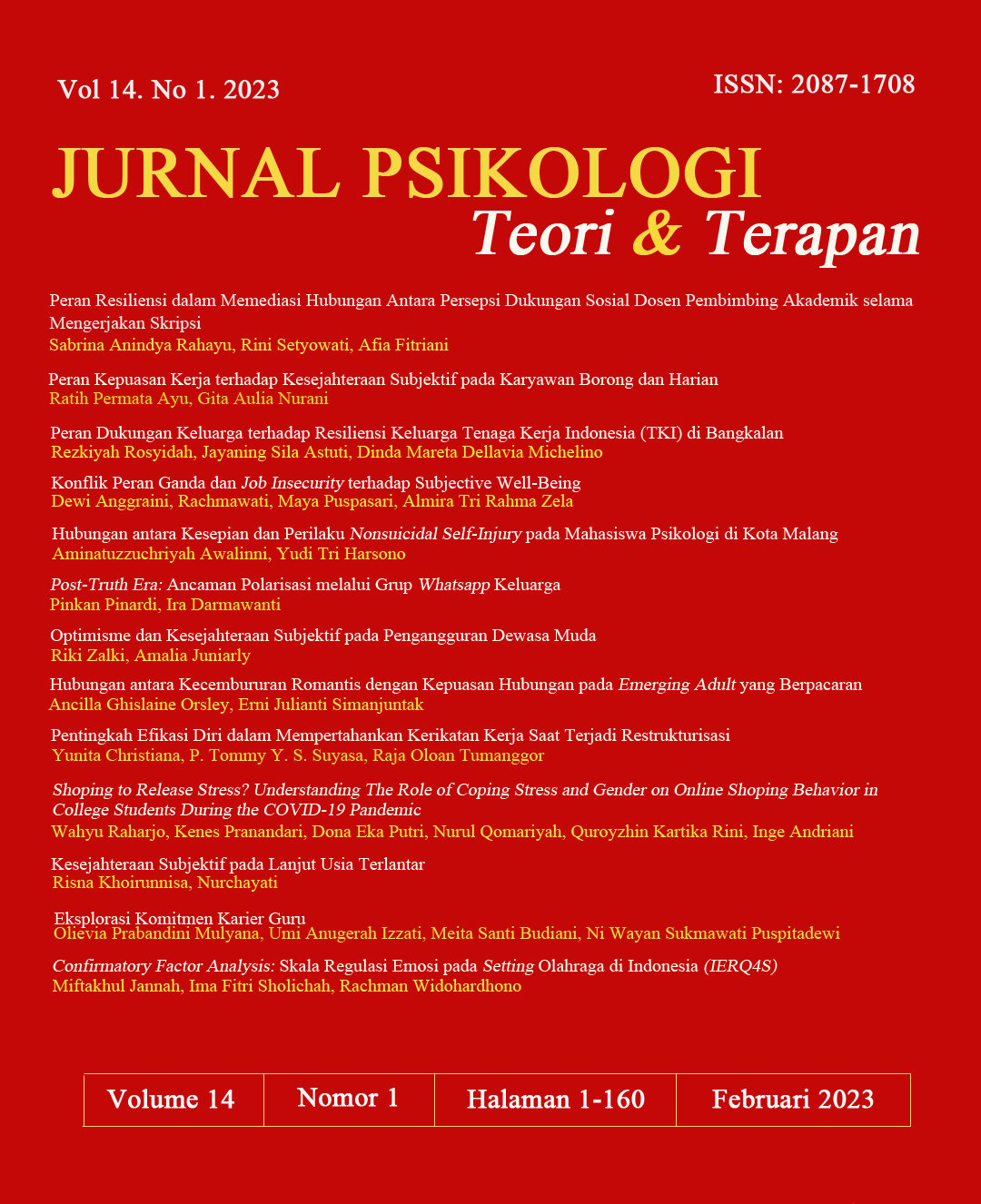Optimisme Dan Kesejahteraan Subjektif Pada Pengangguran Dewasa Muda
DOI:
https://doi.org/10.26740/jptt.v14n1.p79-89Keywords:
Afek negatif, Afek positif, Kepuasan Hidup, Optimisme, Kesejahteraan SubjektifAbstract
Besarnya angka pengangguran di Indonesia saat ini masih menjadi sebuah problem ketenagakerjaan yang dihadapi. Ketidak seimbangan angka angkatan kerja dan jumlah lowongan kerja juga ikut menjadi faktor masih tingginya angka pengangguran di Indonesia. Akibat dari kondisi menganggur ini juga akan berdampak buruk pada kesejahteraan subjektif yang juga berdampak pada menurunnya optimisme. Tujuan penelitian ini untuk mengetahui hubungan antara optimisme dan kesejahteraan subjektif pada pengangguran dewasa muda. Ada 3 hipotesis dalam penelitian ini, yaitu ada hubungan antara optimisme dengan: (1) pleasant affect; (2) unpleasant affect, dan (3) life satisfaction. Partisipan dalam penelitian ini adalah 200 pengangguran dewasa muda di Indonesia. Teknik sampling yang digunakan adalah sampling purposive. Variabel kesejahteraan subjektif diukur dengan menggunakan skala kesejahteraan subjektif yang disusun oleh peneliti mengacu pada komponen yang dikemukakan oleh Diener, Suh, Lucas, dan Smith (1999). Untuk mengukur variabel optimisme digunakan skala optimisme yang disusun oleh peneliti mengacu pada dimensi yang dikemukakan oleh Seligman (2008). Analisis data dilakukan dengan menggunakan teknik korelasi pearson product moment. Hasil analisis korelasi menunjukkan bahwa optimisme dan pleasant affect dan life satisfaction menunjukkan hubungan positif yang signifikan. Sementara antara optimisme dan unpleasant affect menunjukkan hubungan negatif yang signifikan. Dengan demikian seluruh hipotesis yang diajukan dalam penelitian ini dapat diterima.
References
BPS. (2021a). Februari 2021: tingkat pengangguran terbuka (TPT) sebesar 6,26 persen. Retrieved from https://www.bps.go.id/pressrelease/2021/05/05/1815/februari-2021--tingkat-pengangguran-terbuka--tpt--sebesar-6- 26-persen.html
BPS. (2021b). Tingkat pengangguran terbuka berdasarkan kelompok umur 2019-2021. Retrieved from https://www.bps.go.id/indicator/6/1180/1/tingkat-pengangguran-terbuka-berdasarkan-kelompok-umur.html
Compton, W. C., & Hoffman, E. (2013). Positive psychology: the science of happiness and flourishing (second edition). Cengage Learning, 402.
Disnaker. (2019). Masalah Tenaga Kerja Dan Lapangan Kerja. Retrieved from https://disnaker.bulelengkab.go.id/artikel/masalah-tenaga-kerja-dan-lapangan- kerja-32
Eberl, A., Collischon, M., & Wolbring, T. (2021). Subjective well-being scarring through unemployment : new methods, new results ?. https://doi.org/10.31235/osf.io/t57cd
Eid, M., & Larsen, R. J. (2008). The science of subjective well-being. In Choice Reviews Online (Vol. 45, Issue 10). https://doi.org/10.5860/choice.45-5867
Elena, M. (2020). BPS: Jumlah Lowongan Pekerjaan Turun 70 Persen Akibat Covid-19. Retrieved from https://ekonomi.bisnis.com/read/20200430/9/1234967/bps-jumlah-lowongan-pekerjaan-turun-70-persen-akibat-covid-19
Ervasti, H., & Venetoklis, T. (2010). Unemployment and subjective well-being: an empirical test of deprivation theory, incentive paradigm and financial strain approach. Acta Sociologica, 53(2), 119-139. https://doi.org/10.1177/0001699310365624
Goldsmith, A., & Diette, T. (2012). Exploring the link between unemployment and mental health outcomes. American Psychological Association. https://www.apa.org/pi/ses/resources/in dicator/2012/04/unemployment
Graham, C., & Soumya, C. (2012). Gender and well-being around the world. Global Economy and Development. Retrieved from https://www.brookings.edu/wp-content/uploads/2016/06/08-gender-and-well-being-graham.pdf
Hurlock, E. B. (2009). Psikologi perkembangan : suatu pendekatan sepanjang rentang kehidupan (5th ed.). Erlangga.
Merino, M. D., Privado, J., & Arnaiz, R. (2018). Is there any relationship between unemployment in young graduates and psychological resources? an empirical research from the conservation of resources theory. Universidad Complutense de Madrid, 35,n. https://doi.org/https://doi.org/10.5093/jwop2019a1
Rizaty, M. A. (2021). BPS : Tingkat pengangguran anak muda semakin tinggi saat pandemi. 2021. Retrieved from https://databoks.katadata.co.id/datapublis h/2021/08/31/bps-tingkat-pengangguran- anak-muda-semakin-tinggi-saat-pandemi#
Schmitt, C. (2008). Gender-specific effects of unemployment on family formation: a cross-national perspective. German Institute for Economic Research.
Seligman, M. E. P. (2008). Menginstal optimisme (B. Yogapranata (ed.)). PT. Karya Kita.
Subroto, S. (2012). Hubungan sekolah dengan masyarakat. PT Rineka Cipta.
Sukirno, S. (2006). Makroekonomi teori pengantar. PT Raja Grafindo Persada.
Yanuar. (2009). Ekonomi makro : Suatu Analisis Untuk Konteks Indonesia (1st ed.). Yayasan Mpu Ajar Artha.
Downloads
Published
How to Cite
Issue
Section
License

This work is licensed under a Creative Commons Attribution-NonCommercial 4.0 International License.
Authors who publish in this journal agree to the following terms:
Copyright in any article is held by the author.
The author grants the journal, publication rights with the work simultaneously licensed under a Creative Commons Attribution License that allows others to share the work with an acknowledgment of the work's authorship and initial publication in this journal.
Authors may enter into separate, additional contractual arrangements for the non-exclusive distribution of the journal's published version of the work (e.g., posting it to an institutional repository or publishing it in a book), with an acknowledgment of its initial publication in this journal.
Authors are permitted and encouraged to post their work online (e.g., in an institutional repository or on their website) prior to and during the submission process, as this can lead to productive exchanges, as well as earlier and greater citation of published work.
 Abstract views: 1763
,
Abstract views: 1763
, PDF Downloads: 1805
PDF Downloads: 1805


















